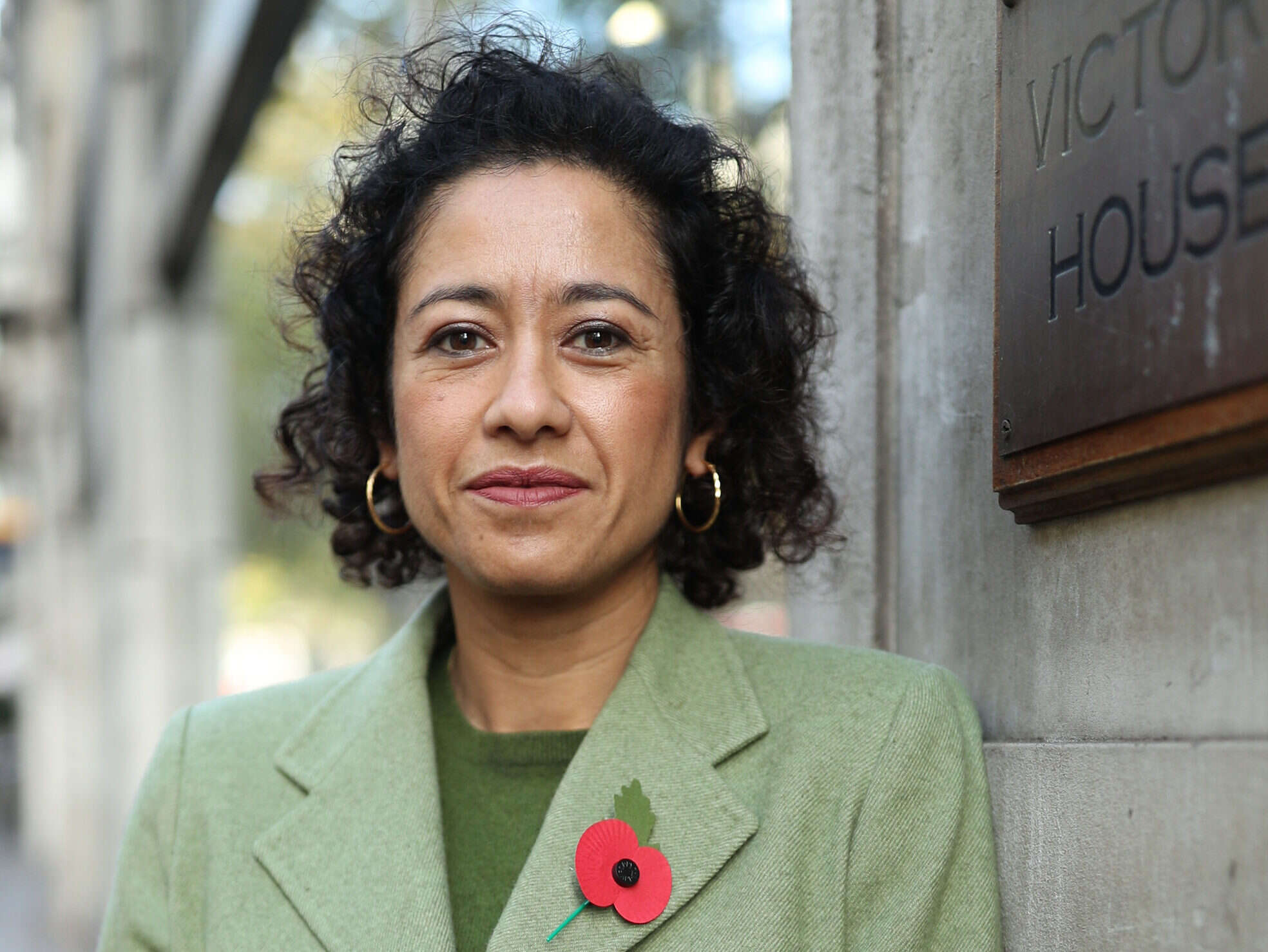
Journalist Samira Ahmed has won her equal pay case against the BBC, saying she is “glad” the issue has been resolved and is looking forward to continuing her work as a reporter for the broadcaster.
The judge and panel of experts at London Central Employment Tribunal unanimously agreed that Ahmed’s work presenting BBC TV programme Newswatch was equal to that of Jeremy Vine as presenter of Points of View.
It was revealed ahead of the tribunal, which began in October last year, that Vine was paid nearly seven times more than Ahmed.
The journalist’s claim covers a period of six years until Vine left the show in 2018. She was paid £440 per episode, later rising to £465, while Vine earned £3,000 from when he took over from Terry Wogan in 2008.
His fee was cut to £1,300 in 2018 after he was revealed as the highest-paid BBC journalist in 2017, when the broadcaster was forced to publish the salaries of its on-air talent paid more than £150,000. He also agreed to take a pay cut on the other shows he presented.
Both shows are under 15 minutes long and cover audience feedback on BBC content. Newswatch focuses on opinions about BBC news coverage while Points of View covers any genre.
In her written judgment today, employment judge Harjit Grewal said: “The difference in pay in this case was striking. Jeremy Vine was paid more than six times what the claimant was paid for doing the same work.”
‘I love working for the BBC’
Ahmed is seeking nearly £700,000 in back pay. It is now up to the BBC to either appeal the judgment, quibble the amount claimed, or pay out.
In a statement on the ruling, Ahmed said: “No woman wants to have to take action against their own employer. I love working for the BBC. I’m glad it’s been resolved.
“I’d like to thank my union the NUJ, especially Michelle Stanistreet the general secretary, my legal team Caroline Underhill of Thompsons Solicitors and my barrister Claire Darwin and everyone – all the men and women who’ve supported me and the issue of equal pay.
“I’m now looking forward to continuing to do my job, to report on stories and not being one.”
In short the BBC failed to provide enough evidence to defend its case, with a number of its arguments dismissed by the tribunal.
Stanistreet said it was a “resounding victory” for Ahmed, who made the “incredibly brave” decision to take the matter to tribunal. She arrived on the first day surrounded by BBC colleagues and supporters.

Samira Ahmed arrives at Central London Employmnt Tribunal with BBC colleagues as she takes the corporation to court over an equal pay dispute. Picture: Press Gazette
“No-one wants to battle their employer in a public tribunal hearing, but the BBC’s failure to meaningfully negotiate made legal proceedings inevitable,” said Stanistreet.
“For the BBC this became a battle over the differences as they saw it between their internal divisional silos of news and entertainment.
“For the NUJ, this was simply a case of two roles that were commensurate, on two programmes that were supremely comparable, carried out by two high profile experienced presenters.”
BBC: ‘We’re committed to equality and equal pay’
The BBC said it will “consider the judgment carefully” before deciding its next move.
A spokesperson for the corporation said: “Samira Ahmed is an excellent journalist and presenter and we regret that this case ever had to go to tribunal.
“We’re committed to equality and equal pay. Where we’ve found equal pay cases in the past we’ve put them right. However, for us, this case was never about one person, but the way different types of programmes across the media industry attract different levels of pay.
“We have always believed that the pay of Samira and Jeremy Vine was not determined by their gender. Presenters – female as well as male – had always been paid more on Points of View than Newswatch.
“We’re sorry the tribunal didn’t think the BBC provided enough evidence about specific decisions – we weren’t able to call people who made decisions as far back as 2008 and have long since left the BBC.
“In the past or pay framework was not transparent and fair enough, and we have made significant changes to address that; we’re glad this satisfied the Tribunal that there was sufficient evidence to explain her pay now.
“We’ll need to consider this judgment carefully. We know tribunals are never a pleasant experience for anyone involved. We want to work together with Samira to move on in a positive way.”
In a statement, BBC Women, a group made up of hundreds of reporters and producers at the corporation, said: “The unanimous judgment in Samira Ahmed’s employment tribunal case deserves to be real game changer, and not just at the BBC.
“Fifty years after the original equal pay legislation, women should not have to continue to find the courage to fight these battles.
“The BBC should now move to resolve the many outstanding cases which we know still exist and have been put through lengthy internal processes – some lasting years.”
‘If it told him to roll his eyes, he did’
In her judgment, Judge Grewal said it was clear from the evidence heard at tribunal that Ahmed and Vine did work that was “the same, or if not the same, very similar”, and that any differences were only “minor”.
It said the BBC had claimed the presenter of Points of View “needed to have ‘a glint in the eye’ and to be cheeky,” in its evidence to the tribunal, as opposed to the more serious tone of Newswatch.
But the judge said she “had difficulty in understanding” what the BBC meant and “how that translated into a ‘skill’ or ‘experience’ to do a job”.
She said the light-hearted and cheeky tone of Points of View was “achieved primarily by the script being written in a particular style”.
“Jeremy Vine read the script from the auto-cue. He read it in the tone in which it was written. If it told him to roll his eyes, he did. It did not require any particular skill or experience to do that,” she said.
“We do not accept that the lighter tone of Points of View meant that [Ahmed’s] work and that of Mr Vine were not broadly similar.”
Points of View is ‘factual’ programme, judge rules
The judge rejected the BBC’s claim that Points of View fell under the “entertainment” genre of programme, a central tenet of the BBC’s defence, ruling that it was “factual” programming.
It was not disputed that Newswatch was a news programme, but the tribunal judge said the difference between “news” and “factual” had no impact on the work done by both presenters.
“We do not accept that Mr Vine’s role had any additional responsibility”, the judge ruled, adding it was “certainly no greater than the responsibility of the presenter of Newswatch”.
The judge said Vine was paid above the market rate for Points of View at the time.
She also said viewing figures for both programmes had no bearing on the issue of equal pay.
Because it found Ahmed and Vine to have done the same or similar work, the tribunal did not have to rule on whether the work was of equal value.
Regardless, the judge said the BBC had “failed to show” that the difference in pay was down to anything other than gender.
When the BBC talked about the public profile of presenters it meant “broadcasting range and experience”, the judge said.
But she added: “What the evidence before us does indicate strongly is that broadcasting and experience was not taken into account in setting the pay for the presenters of Newswatch.”
Otherwise, it said, Ahmed would not have been paid the same as her predecessor, Ray Snoddy, “who had no broadcasting experience when he was appointed to the role”.
BBC pay process ‘not transparent’
The judge said the tribunal had not heard from anyone at the BBC who was involved in making pay decisions for Ahmed and Vine when their contracts were first drawn up.
While she said she recognised that the decisions were “made long ago” she rebuked the corporation, saying: “Those difficulties are easily surmountable if an organisation has transparent pay structures or processes for determining pay and for recording the rationale of its decision about levels of pay.
“The BBC found itself in difficulties in this case because it did not (and, to an extent, still does not) have a transparent and consistent process for evaluating and determining pay for its on-air talent.
“It has no records (or, if it has them, it has not produced them) of how the pay levels for [Samira Ahmed] and Jeremy Vine were determined.”
Ahmed previously secured an agreement from the BBC to receive full backdated pay with her male counterparts for her work on Front Row and Night Waves/ Free Thinking on BBC Radio 3.
Read the full judgment.
Picture: Yui Mok/PA Wire
Email pged@pressgazette.co.uk to point out mistakes, provide story tips or send in a letter for publication on our "Letters Page" blog
